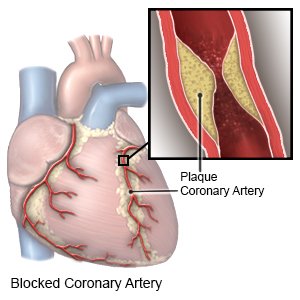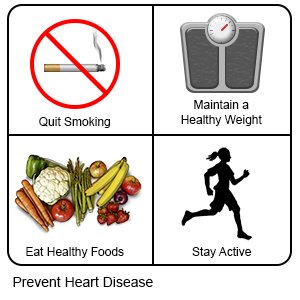Coronary Artery Disease
Medically reviewed by Drugs.com. Last updated on Sep 23, 2025.
Coronary artery disease (CAD) is narrowing of the arteries to your heart caused by a buildup of plaque (cholesterol and other substances). The narrowing in your arteries decreases the amount of blood that can flow to your heart. This causes your heart to get less oxygen, which may be life-threatening.
 |
DISCHARGE INSTRUCTIONS:
Call your local emergency number (911 in the US), or have someone call if:
- You have any of the following signs of a heart attack:
- Squeezing, pressure, or pain in your chest
- You may also have any of the following:
- Discomfort or pain in your back, neck, jaw, stomach, or arm
- Shortness of breath
- Nausea or vomiting
- Lightheadedness or a sudden cold sweat
Seek care immediately if:
- You have chest pain that happens often.
- You have chest pain at rest.
Call your doctor or cardiologist if:
- You feel depressed or anxious.
- You have questions or concerns about your condition or care.
Cardiac rehabilitation(rehab)
is a program run by specialists who will help you safely strengthen your heart and reduce the risk for more heart disease. The plan includes exercise, relaxation, stress management, and heart-healthy nutrition. Healthcare providers will also check to make sure any medicines you are taking are working.
Medicines:
You may need any of the following:
- Blood pressure medicines are given to lower your blood pressure. These medicines may include ACE inhibitors and beta-blockers. ACE inhibitors help keep your blood vessels relaxed and open. This helps keep blood flowing into your heart. Beta-blockers keep your heart pumping strongly and regularly. This helps keep your heart from working too hard to get oxygen.
- Cholesterol medicines help lower blood cholesterol levels.
- Nitrates , such as nitroglycerin, relax the arteries of your heart so it gets more oxygen. Nitrates may also help relieve your chest pain.
- Diuretics help your body get rid of extra fluid and protect your heart from more damage. You may urinate more often while you are taking diuretics.
- Antiplatelets , such as aspirin, help prevent blood clots. Take your antiplatelet medicine exactly as directed. These medicines make it more likely for you to bleed or bruise. If you are told to take aspirin, do not take acetaminophen or ibuprofen instead.
- Blood thinners help prevent blood clots. Clots can cause strokes, heart attacks, and death. Many types of blood thinners are available. Your healthcare provider will give you specific instructions for the type you are given. The following are general safety guidelines to follow while you are taking a blood thinner:
- Watch for bleeding and bruising. Watch for bleeding from your gums or nose. Watch for blood in your urine and bowel movements. Use a soft washcloth on your skin, and a soft toothbrush to brush your teeth. This can keep your skin and gums from bleeding. If you shave, use an electric shaver. Do not play contact sports.
- Tell your dentist and other healthcare providers that you take a blood thinner. Wear a bracelet or necklace that says you take this medicine.
- Do not start or stop any other medicines or supplements unless your healthcare provider tells you to. Many medicines and supplements cannot be used with blood thinners.
- Take your blood thinner exactly as prescribed by your healthcare provider. Do not skip a dose or take less than prescribed. Tell your provider right away if you forget to take your blood thinner, or if you take too much.
- Take your medicine as directed. Contact your healthcare provider if you think your medicine is not helping or if you have side effects. Tell your provider if you are allergic to any medicine. Keep a list of the medicines, vitamins, and herbs you take. Include the amounts, and when and why you take them. Bring the list or the pill bottles to follow-up visits. Carry your medicine list with you in case of an emergency.
Manage or prevent CAD:
- Do not take certain medicines without asking your healthcare provider first. These include NSAIDs, herbal or vitamin supplements, or hormones (estrogen or progestin).
- Do not smoke. Nicotine and other chemicals in cigarettes and cigars can cause heart and lung damage. Ask your provider for information if you currently smoke and need help to quit. E-cigarettes or smokeless tobacco still contain nicotine. Talk to your provider before you use these products.
- Be physically active. Physical activity, such as exercise, can lower your blood pressure, cholesterol, weight, and blood sugar levels. Healthcare providers will help you create physical activity goals. They can also help you make a plan to reach your goals. For example, you can break activity into 10-minute periods, 3 times in the day. Find activities you enjoy. This will make it easier for you to reach your goals.

- Maintain a healthy weight. Ask your provider what a healthy weight is for you. Your provider can help you create a safe weight loss plan, if needed. A weight loss of at least 10% can improve your heart health.
- Eat heart-healthy foods. Include fresh fruits and vegetables in your meal plan. Choose low-fat foods, such as skim or 1% fat milk, low-fat cheese and yogurt, fish, chicken (without skin), and lean meats. Eat two 4-ounce servings of fish high in omega-3 fats each week, such as salmon, fresh tuna, and herring. Avoid foods high in trans fat, such as baked goods or fried foods.

- Limit sodium (salt) as directed. Avoid foods that are high in sodium, such as canned foods, potato chips, salty snacks, and cold cuts. If you add salt when you cook, do not add more salt at the table.

- Limit or do not drink alcohol. A drink of alcohol is 12 ounces of beer, 5 ounces of wine, or 1½ ounces of liquor. Your provider can tell you how many drinks are okay within 24 hours and within 1 week.
- Manage other health conditions. Follow your provider's advice on how to manage other conditions that can affect your heart health. These include diabetes, high blood pressure, and high cholesterol. You may need to take medicines for these conditions and make other lifestyle changes.
- Manage stress. Stress can raise your blood pressure. Find new ways to relax, such as deep breathing or listening to music.
- Ask about vaccines you may need. Your provider can tell you which vaccines you need, and when to get them. The following vaccines help prevent diseases that can become serious for a person with CAD:
- Ask your healthcare provider about the flu and pneumonia vaccines. All adults should get the flu (influenza) vaccine as soon as recommended each year, usually in September or October. The pneumonia vaccine is recommended for all adults aged 50 or older to prevent pneumococcal disease, such as pneumonia. Adults aged 19 to 49 years who are at high risk for pneumococcal disease should also receive the vaccine. You may need 1 dose or 2. The number depends on the vaccine used and your risk factors.
- COVID-19 vaccines are given to adults as a shot. At least 1 dose of an updated vaccine is recommended for all adults. COVID-19 vaccines are updated throughout the year. Adults 65 or older need a second dose of updated vaccine at least 4 months after the first dose. Your healthcare provider can help you schedule all needed doses as updated vaccines become available.
 |
Treatment options
The following list of medications are related to or used in the treatment of this condition.
Follow up with your doctor or cardiologist as directed:
You may need to return for other tests. You may also be referred to a cardiac surgeon. Write down your questions so you remember to ask them during your visits.
© Copyright Merative 2025 Information is for End User's use only and may not be sold, redistributed or otherwise used for commercial purposes.
The above information is an educational aid only. It is not intended as medical advice for individual conditions or treatments. Talk to your doctor, nurse or pharmacist before following any medical regimen to see if it is safe and effective for you.
Learn more about Coronary Artery Disease
Treatment options
- Medications for Cardiovascular Conditions and Disorders
- Medications for Coronary Artery Disease
- Medications for History (Familial) - Ischemic Heart Disease
- Medications for Ischemic Heart Disease
Care guides
Symptoms and treatments
Further information
Always consult your healthcare provider to ensure the information displayed on this page applies to your personal circumstances.
